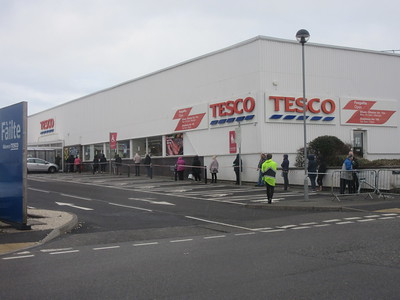Going to the supermarket meant a twenty minute excursion for me, but last Wednesday's once-weekly outing took me over an hour. Queuing in a line with 2 metres (7 feet) between each person, then only being allowed in once another customer had exited. The problems with stock remain, although not quite as bad over the past weeks. I was quite angered to see photographs of litterbins, overflowing with panic-bought goods and foods, which people did not have the storage space for once they arrived home. Schools and colleges too have shut, Laxdale Primary leaving a notice that the better days will return. The ferry is on a greatly reduced service, with the morning sailings reserved for freight, and the afternoon and evening ones dedicated to passengers and cars. Planes have stopped flying to and from the airports in the Highlands and Islands, with only essential and lifeline services remaining.
As I type this, the nadir of the coronavirus epidemic is set to reach the United Kingdom, with helicopters being deployed to evacuate medical emergencies from remote areas. Shetland has a cluster of two dozen cases (as of 27 March), and one person has already had to be airlifted to Aberdeen. The Outer Hebrides have, as of the same date, no cases of Covid-19. Orkney is in the same position. Shetland's cases have arisen after a family returned from a holiday in Italy - a hotspot for Covid-19, in the earlier stages of the pandemic.
There is something to be said for living in a remote island.

Cromwell Street, Thursday afternoon


Queueing system, Tesco Supermarket


